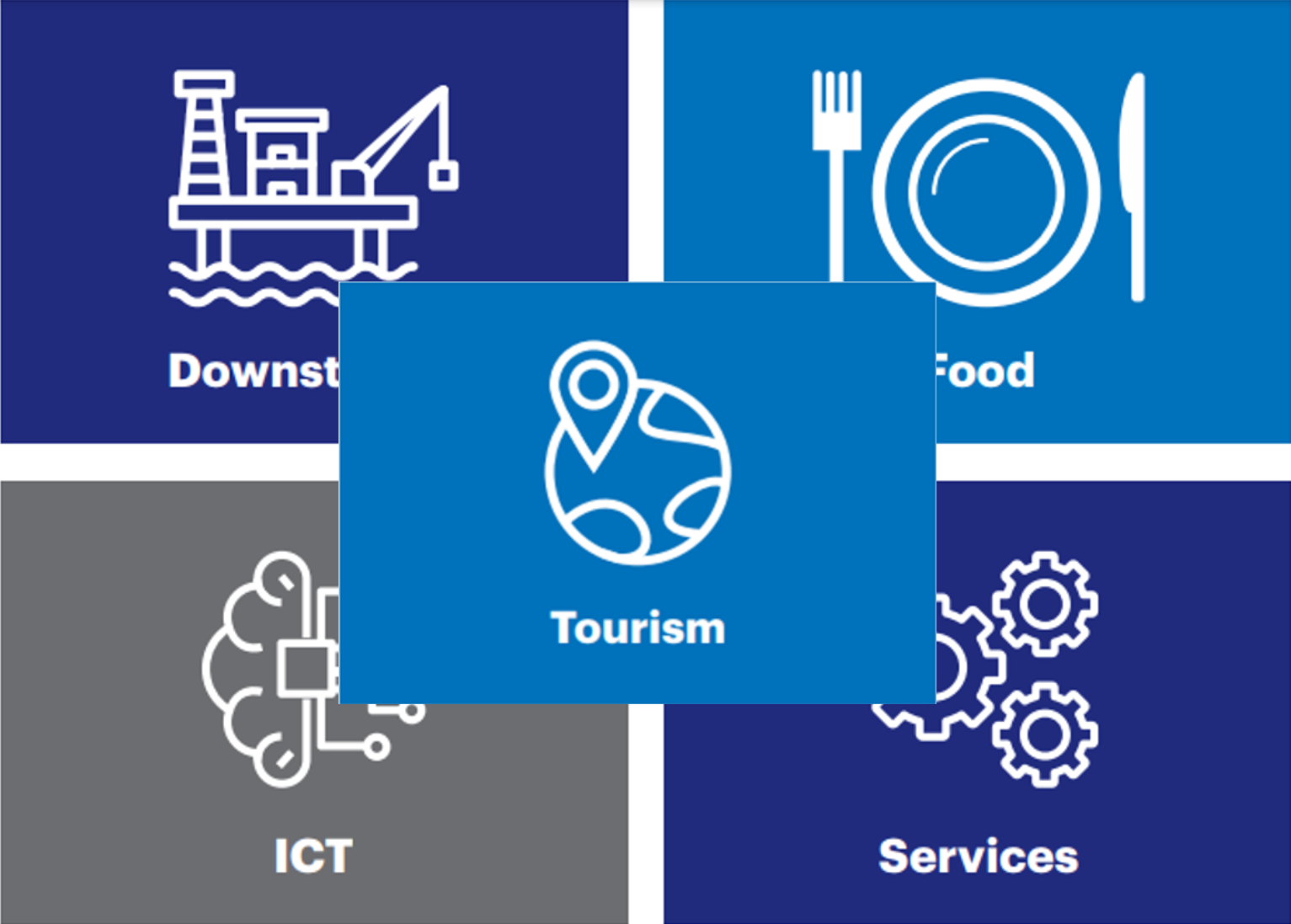By capitalizing on the country's strengths, Brunei Darussalam has taken strategic initiatives to create 5 priority clusters namely Downstream Oil & Gas, Food, ICT, Services, & Tourism.

Downstream Oil & Gas Industry
With more than 90 years of experience in the oil and gas sector, Brunei Darussalam has developed expertise and strength, particularly in upstream and liquified natural gas (LNG). Moving forward, the Brunei Government would like to place a much greater focus on the development of the downstream oil and gas industry, being a vital component in our goal towards economic diversification.
The Government welcomes partnership with both foreign direct investment (FDI) and domestic direct investment (DDI) to realise these downstream activities that extend the methanol, ammonia and aromatics value chain to produce downstream products such as, but not limited to Acetic Acid, Aniline, Cyclohexane, Capcrolactam, Ethylene Vinyl Acetate. These products will further promote opportunities in the manufacturing of pharmaceuticals, textiles, plastics, food additives and agricultural products.
Sites have been identified for new projects in close proximity to existing and future petrochemical plants so as to achieve cross-industry synergy, optimise logistical efficiency and sharing of common infrastructure and utilities.
Food
In the Food Sector, Brunei Darussalam aims to increase the production of halal, safe and high-quality food and strengthen the industry's value chain that contribute significantly to economic growth, exports as well as food security.
Towards this end, Brunei Darussalam welcomes aquaculture farming companies focusing on high-value species, as well as high-technology agriculture companies, to set up in Brunei Darussalam. Value-added processing activities can also be undertaken with readily available raw materials ranging from shrimps, barramundi and many other fishery varities.
Brunei Darussalam's stringent halal certification process is highly regarded. A series of documentations on standards and guidelines pertinent to the food industry has been published, namely: PBD 38:2022 Good Manufacturing Practices; PBD 24:2007 Halal Food Standard; GD 24:2010 Halal Guidelines for the Manufacture and Handling of Medicine, Traditional Medicines, and Health Supplements.
These documents serve as a guide for potential investors interested in venturing into the food industry in the country. Brunei Darussalam's halal certification mark is also backed by several Acts and Orders, thus ensuring the integrity of the certification mark.
To ensure products sold within the domestic market, including those locally produced, meet Brunei Darussalam's halal requirements, the Halal Science and Metrology Centre conducts halal food analysis at its laboratory facilities. The Centre's equipment is able to detect porcine DNA and proteins, alcohols, oils, fats, lards, gelatine and other substances which may render a product to be non-halal. The Centre also provides technical support to the Ministry of Religious Affairs for halal certification applications.
ICT
Brunei Darussalam has identified the ICT Industry as one of the clusters that can help diversify the economy. Various efforts have been put in place to develop this industry further, including the establishment of industrial parks for the development of the technology industry; namely the Anggerek Desa Technology Park, a 16-hectare site.
Services
In order to support the development of Brunei Darussalam's priority clusters, emphasis continues to be placed to improve the Services sector.
The services sector covers a wide range of sub-sectors, including the following:
•Transportation and Logistics;
•Financial Services; and
•Business Process Outsourcing.
By leveraging on Brunei Darussalam's strategic location at the heart of ASEAN and on a number of important trade routes including the Maritime Silk Road, as well as its access to raw materials from BIMP-EAGA and key markets in Asia Pacific and Oceania through various Free Trade Agreements (FTAs). Brunei Darussalam can be an ideal destination for foreign direct investment (FDI) companies to establish their regional trading, processing and distribution operations to cover the market within BIMP-EAGA, ASEAN, China and Australia to name a few.
The increase in demand for logistics services will naturally create a need for a for a robust supporting ecosystem. As such, Brunei Darussalam foresees and welcomes investments in various support activities which include:
•Ship maintenance and repairs
•Container maintenance and repairs
•Supply Chain Management
•Warehousing
Tourism Industry
Brunei Darussalam offers itself as an ideal destination for tourists and business travelers, who will be able to enjoy the country’s clean and green environment, unique culture and heritage, and numerous nature-based activities and attractions.
As a developing industry, tourism offers various business and investment opportunities for local and international companies. In line with national efforts led by the Ministry of Primary Resources and Tourism Board, Brunei Darussalam welcomes international companies to become partners in developing the following projects:
•To strengthen Brunei Darussalam's primary products: the Ulu Temburong National Park, Kampong Ayer (Water Village) and Bandar Seri Begawan;
•To develop emerging products and destinations: bird watching, diving, summer schools, secretariat building, Islamic tourism, medical tourism and cultural tourism; and
•To increase the quality of tourism services by stakeholders such as travel agencies, airlines, transport services and accommodation providers.